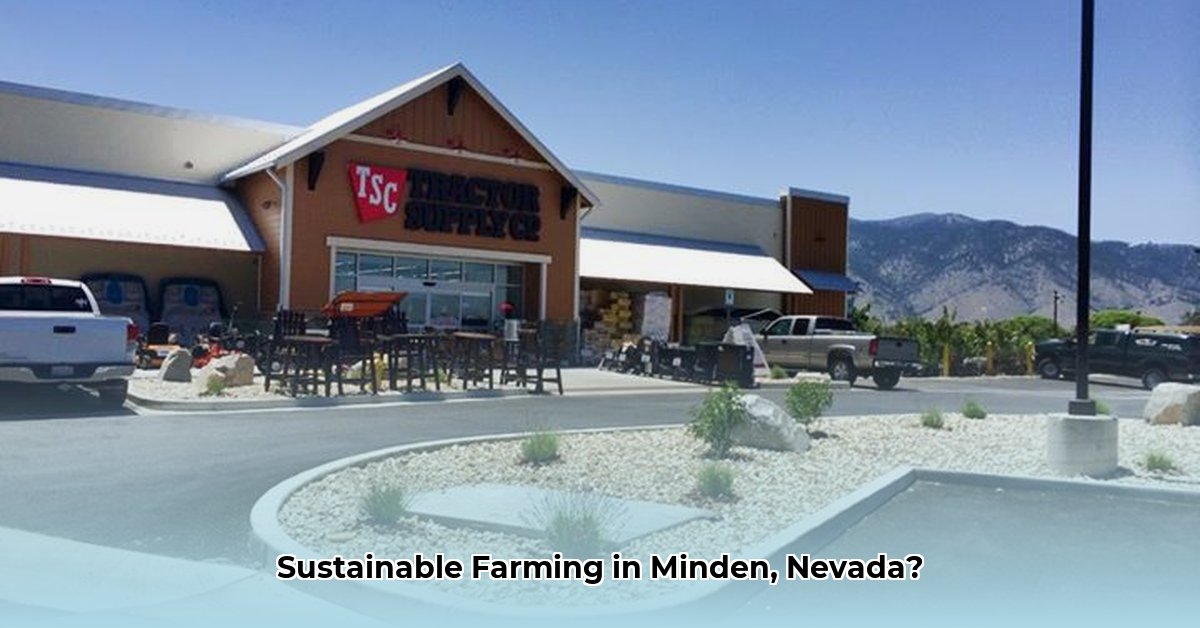
Tractor Supply (TSC) in Minden, Nevada, plays a significant role in the local agricultural landscape, supplying farmers and gardeners with essential tools and resources. However, its contribution to sustainable farming practices in the challenging Nevada desert climate requires closer examination. For water conservation ideas, check out these rain barrel options. This article explores TSC's offerings, analyzes its potential impact on sustainable agriculture, identifies gaps, and proposes actionable recommendations.
Tractor Supply Minden Nevada: Product Offerings and Sustainability
TSC Minden offers a broad range of products, including animal feed, fencing materials, gardening tools, and heavy-duty equipment. While convenient, the sustainability of these products and their sourcing remains largely opaque. The availability of organic options, while present, isn't consistently emphasized, leaving customers to decipher the environmental impact of each purchase. This lack of transparency poses a challenge, hindering TSC's potential to actively promote sustainable agriculture. How can consumers confidently choose eco-friendly options when information is scarce?
Sustainable Farming in Nevada's Arid Climate: A Unique Set of Challenges
Farming in Nevada's high desert presents significant hurdles. Water scarcity is a major constraint, requiring farmers to adopt innovative water-efficient approaches such as drip irrigation and drought-resistant crops. Soil health, another critical factor in sustainable farming, demands careful management given the arid environment. Are these challenges being adequately addressed by the available resources at TSC?
Analyzing Tractor Supply's Environmental Impact: Gaps and Opportunities
A comprehensive assessment of TSC's environmental footprint is currently lacking. Information concerning their supply chain, packaging, and transportation practices is limited, preventing a full evaluation of their current sustainability initiatives. This lack of transparency presents a substantial opportunity for improvement. Without data on their environmental impact, how can TSC credibly claim to support sustainable farming practices?
Recommendations for Enhanced Sustainability at TSC Minden
To enhance its contribution to sustainable agriculture, TSC Minden should adopt a multi-pronged approach encompassing short-term and long-term actions:
Short-Term Actions (Within 1 Year):
Conduct a Life Cycle Assessment (LCA): Perform a comprehensive LCA on key product lines to determine their environmental impact from origin to disposal. (LCA is a technique to assess the environmental aspects and potential impacts associated with all the stages of a product's life from raw material acquisition through production, use, end-of-life treatment and disposal.) This analysis will identify areas for immediate improvements.
Partner with Local Organizations: Collaborate with local environmental groups and agricultural experts to develop educational programs and workshops on sustainable farming practices. This will foster community engagement and expertise sharing.
Enhance Product Labeling: Improve product labels to include clear information about sustainability certifications and the environmental impact of the items for sale. Honest and transparent labeling empowers consumers to make informed eco-conscious choices.
Long-Term Actions (3-5 Years):
Develop a Comprehensive Sustainability Policy: Create a detailed sustainability strategy encompassing all facets of the business, from sourcing raw materials to waste management. This will provide a framework for continuous improvement.
Increase Sustainable Product Selection: Expand the range of organic and sustainably produced products offered to meet the growing consumer demand for eco-friendly options. A larger selection significantly encourages sustainable choices.
Implement Sustainable Supply Chain Practices: Work with suppliers committed to sustainable and ethical practices. This strengthens transparency and accountability throughout the entire supply chain.
Invest in Renewable Energy: Transition to renewable energy sources at the Minden store to reduce its carbon footprint. A demonstrable commitment to renewable energy signals a dedication to environmental stewardship.
Conclusion: A Call for Collaboration in Building a Sustainable Future
Tractor Supply Minden has the potential to be a significant catalyst for sustainable agriculture in the region. By embracing transparency, investing in data-driven analysis, and forging strong community partnerships, TSC can transform its role from a supplier of agricultural inputs to an active promoter of sustainable practices. This collective effort will not only benefit local farmers but also contribute to a healthier environment for the entire Minden community. The question remains: will TSC seize this opportunity?